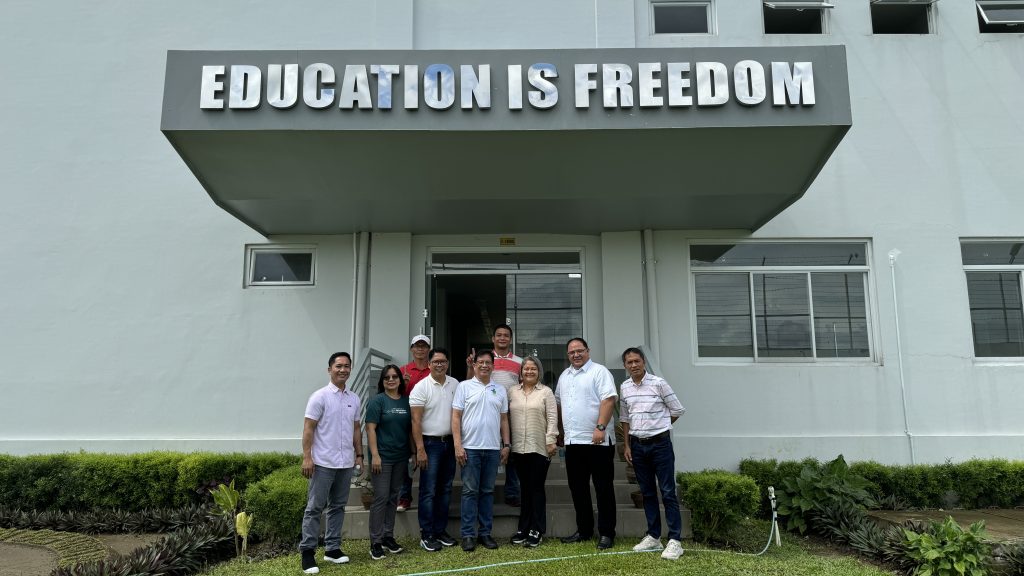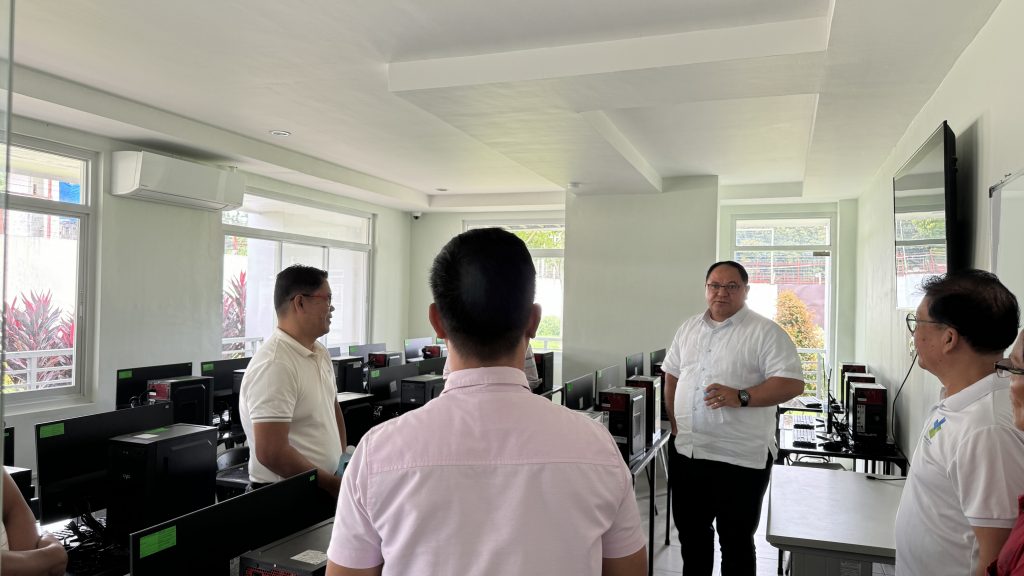
IN ACCORDANCE with humanity’s worth and value and considering the human heart, spirit, mind, and physical being, we understand that holistically we live in a physical and spiritual world. The absence of one aspect will lead us to the collapse of the full individual. Education that develops the whole person, therefore, is best.
Probably many of us believe, however, that educational opportunities for Persons Deprived of Liberty (PDL) are only beneficial for those participating, but it is actually the complete opposite. The community benefits as a whole when PDLs are able to better themselves and reduce their rate of recidivism. Our criminal justice system is broken, and we have a way to fix it through low-cost education programs, such as SETBI’s College Education Behind Bars, which partners with the University of Southeastern Philippines for its SETBI-USEP Model and with Davao del Norte State College for its SETBI-DNSC Model. We all value education yet often fail to consider carceral education.
Many of the PDL in the Davao City Jail and the Davao Penal and Prison Farm (DaPeCol) will be released at some point. We need to ask ourselves, “Do we want these PDLs to succeed when they return to our communities?” The real answer is yes; we want and expect released PDL to be transformed and changed so that they become law-abiding, taxpaying, contributing members of our communities. That will not happen without a program that addresses the issues that contributed to the poor decisions that led them to their current plight.
We believe that education is a cost-effective intervention that puts PDL on a different path, one that generates hope and employability. We can decrease the costs of PDL to taxpayers either by reducing the number of people entering the system or by reducing the number of people returning to it. College Education Behind Bars results in a metamorphosis of character and a minimization of costs.
Because the jail/prison population is disproportionately composed of people from low-income communities, many of the PDLs have education levels lower than the average general population, which, coupled with the stigma of a criminal record, makes it difficult for them to find jobs after their release. Many individuals returning home from jail/prison go to the same neighborhood and thus have the same limited choices. Our systems of justice are biased against the poor and marginalized people, and their families are collateral damage. Selective justice offers two systems: one for these poor, marginalized people and the other for the most powerful and rich. People with a prison record, even though they are trying hard to be clean and not to get involved in any illegal activities, are being discriminated against and disenfranchised upon release.
In ameliorating social issues, such as drug use, every one of us has a role to play, including faith-based groups, and they have a vital role. Churches have always played an indispensable role in the communities they serve, providing a place of worship and a source of social welfare. From education and healthcare to addressing social injustice and immigration issues, churches have been a cornerstone of support and advocacy for those in need. Whether through charitable organizations or public service initiatives, the church’s impact on society is undeniable. Thus, the church must engage in societal ills if they are “to proclaim freedom for the captives and release from darkness for the prisoners.”

In transforming lives, communities, and institutions, the College Education Behind Bars has a bona fide benefit, and as people of faith, we have a responsibility to protect the dreams and future of the most vulnerable inside jails and prisons. It is very important that leaders of two of the most important institutions—universities and faith groups—work together because leaders of both are two sides of the same coin. These two institutions played a crucial role in terms of shaping our culture, as our right to worship and our right to an education are integral to the Filipino experience. Both colleges and faith-based groups, such as churches, are deeply interested in helping people learn and work toward wholeness, better character, and thus constructive action. One is the engine and the other is the transmission connecting the engine and the wheels of the person; without either one the vehicle will not move forward. It makes sense for these two institutions to work together to improve our community, especially in the PDL population.
College Education Behind Bars has been a gateway for many PDLs to earn a college degree, graduate, gain full employment, and become law-abiding citizens, and many of the intellectually curious men and women even continue to enroll in rigorous academic programs for professional degrees. However, the resources for College Education Behind Bars are sparse. Not many Christians are assisting in this academic space. Yet, in addressing social issues, everyone has a role to play At the heart of Christian community development requires the church, the body of Christ, to be fully engaged in the process of transformation. The church is uniquely equipped to affirm the dignity, gifts, and skills of individuals and communities, especially, given its mandate to love the least, the most vulnerable.
One problem today has been that the church is not involved in a holistic approach to transforming PDL by developing its communities. Often, the church has been an unfriendly neighbor in incarceration communities across our country. Churches have been guilty of teaching Bible studies only once a week, opening only on Sunday mornings, and/or remembering the disadvantaged only during Christmas, but, otherwise, being almost irrelevant to the needs of the PDL around them. These are important, but Christian community development must increasingly see that taking action is the role of the church in working towards the development of its community.
Again, religious groups traditionally have played a major role in shaping communities. In modern civil societies, religious beliefs are still among the key factors that bond people together to form communities, both large and small. In countries like the Philippines the majority affiliate with the Catholic church. As a social scientist and college educator trying to figure out how faith would come to bear on this social justice issue.
Former Chief Justice Maria Lourdes Sereno had the great foresight to take notice of the problem and helped to set up a meeting with faith-based groups to discuss how Christian institutions of higher learning could address the issue of mass incarceration in the Philippines. She applauded the efforts of SETBI for building the two campuses of College Education Behind Bars, one inside the Davao City Jail and one at DaPeCol, for meeting PDL’s spiritual and physical needs, and for preparing them for successful reentry by partnering with USeP and DNSC, respectively. She challenged some of the faith-based group leaders pointing out that churches halt their work at preaching and teaching when it comes to PDL. She encouraged faith group leaders to join and partner with SETBI to prepare fertile ground for the successful transformation of PDL.
In addition, she recognized that when they are released, they need the faith community to show up, literally, because some have nowhere to go. It is time for the Christian community to rethink how to best leverage its human capital and resources to work for true transformation in the lives of the people in our penal institutions and of the system that incarcerates them at exponential rates.
SETBI believes that preparation for reentry must begin while people are still inside prison so that they are released with the necessary knowledge, skills, and resources both inside and outside to help them make this process successful. But church and faith-based groups, for the most part, have occupied their familiar corrections space, offering worship services and bible studies, which are important of course, but more is needed from them. Teaching biblical precepts or any other faith’s tenets is many of churches and faith-based groups’ comfort zone. Going inside and teaching them once a week or once a month will not be very productive.
Over the years I have noticed that volunteers from various churches or mosques come and offer similar services. It is not uncommon to see representatives from different religious organizations waiting to enter the facility at the same time. According to some of our students, these gatherings were usually well attended because PDL just went for some food, diversion, or other motives. Many of the people who visit the penal facilities are community leaders, so how did they overlook that so many other needs were not being met? Many Christians or faith-based groups have missed the point by only focusing on the spiritual needs of the PDL by taking a missiological approach to PDL’s development.
This approach often focuses on evangelism and discipleship rather than on developing one that is more balanced between spiritual and physical needs. They neglect initiating a more contextualized plan based on an assessment of needs and an understanding of a holistic approach. Especially for the faith-based community whose hearts have been hardened toward PDL, it is time for self-evaluation and perhaps self-criticism.

There are many ways for the faith-based groups to partner with SETBI to help with our PDL students. The churches and SETBI can work with and for the PDLs so that they return to communities better able to contribute, thrive, flourish, and change. Faith-based groups and churches can partner with SETBI to help PDL by providing:
- Resources. Faith-based groups such as churches can provide PDL students with material resources. Sometimes this may be food; sometimes it may be donations of clothing or other durable goods, and sometimes spiritual counseling as well. Churches are filled with people driven by their faith to give generously. With this in mind, faith-based groups such as churches can also provide financial resources to help with special needs and funds for particular programs.
- Community Support. Most importantly, churches can provide SETBI with the opportunity to deepen community relations. Churches can become advocates for the SETBI model approach to reform our PDLs and make our community safe. The church is a gathering of people that can have real and tangible impact. There is power in numbers, in collective interest in solving problems, and in communities that can enable and enlighten a widening circle of people to act. Churches, by getting involved in SETBI’s College Education Behind Bars, can show that communities can have meaningful and mutually beneficial relationships even in the brokenness of today’s society.
- Volunteers. Faith-based groups can provide schools with human resources through the work of trained and passionate volunteers. SETBI is adept at seeing gaps and using volunteers with their unique skills to fill them.
- Helpers with SETBI’s Steps to Recovery Programs. SETBI trains individuals to teach its rigorous and impactful steps program to help the PDL overcome their habits, hangups, hurts, and addictions that led to their incarceration.
It is also important to recognize the impact that SETBI can have on churches in raising:
- Community Awareness. SETBI College Education Behind Bars offers churches an opportunity to better understand the community and its challenges. SETBI tends to be representative spheres of the greater community; by working with local staff, families, and children, congregations can learn more about their communities and seek ways to be more engaged in community development and the building up of its members. One simple way to learn more about the state and future of a community would be to visit a SETBI campus inside the jail or prison to meet our men and women PDL students.
- Sustained Missional Engagement. SETBI can help deepen a church’s sense of mission in the community. The excitement of mission trips to foreign lands leads to the idea that to be transformed through missions in a church environment, you have to go on a mission trip elsewhere. While there is much to be said about short-term missions and what they do for spiritual transformation, something powerful happens when a church and its members make a sustained, long-term commitment to such a proven program as SETBI’s College Education Behind Bars in its community.
- Understanding and Compassion. SETBI’s College Education Behind Bars can give members a better understanding of sin, brokenness, poor choices, addictions, and dysfunctional relationships, but more importantly, compassion, passion, forgiveness, the power of reconciliation, justice, and understanding of oppression and poverty can be very hard to understand, especially when you only look at data. Realizing that thousands of PDLs sooner or later will be released and come to our communities and that many of them will live in poverty helps us to understand that they need a job, a place to stay, and settings where they can feel welcomed. Reentry can be very overwhelming and hard to understand or identify with. We can be desensitized by the sheer breadth of the challenges and issues we face in our communities. SETBI’s College Education Behind Bars programs are microcosms of the community. Outsiders may not be able to fully understand poverty as a whole, the power of sin and addiction, brokenness, or growing up without any positive role model, but getting to know PDL students who struggle can help members have a better understanding of the issues, thus growing their compassion. With compassion comes a quest for justice on behalf of those who cannot advocate for themselves.
SETBI programs deliver a program that results in a college degree and dramatically changes lives, reduces recidivism, and saves taxpayers money. Why would we not be involved in that? Most students who enroll in our program begin to see themselves as college students who are capable of something better for themselves, and they envision a much different future involving work, education, and care for their families. They begin to see themselves as students, not as convicts. Many of the PDL students who are released become fully employed and have zero recidivism.
We encourage every church and faith-based group across the country to start to move in this direction, to make the leap, and to partner with SETBI’s College Education Behind Bars. Partnerships among churches, faith-based groups, and SETBI are a natural progression toward meaningful community engagement and ultimately a glimpse into the kingdom of God.
———————————————————————–
Dr. Aland Mizell
Dr. Aland Mizell is with the MCI, SETBI and is a regular Mindanao Times columnist. You may e-mail the author at aland_mizell2@hotmail.com

